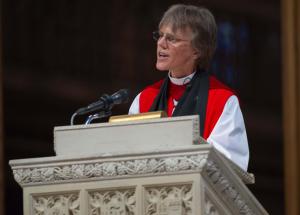Recently Mariann Edgar Budde, an Episcopalian bishop who preached at Donald Trump during a National Cathedral prayer service, pleaded with the newly re-elected Trump “in the name of our god.” When I heard this, I was not so naive to assume that the deity Budde referenced was necessarily the same God that I, or many fellow Evangelicals, believe in and to whom we offer our worship. Only the spiritually undiscerning, or theologically unaware, would assume that because someone stands at the front of a cathedral, wears vestments, and hangs a piece of jewelry in the shape of a cross around their neck they, therefore, must be an authentic follower of Jesus Christ, let alone speak with authority on His behalf. In some cases, we probably should not even assume they believe in God at all. The canvas of religious belief is indeed quite broad in our times, and what counts as true religion is anyone’s guess.
As such, every presentation, especially ones on such a grand stage, must be tested for authenticity. And so it falls upon us to do just that (as best and as often as we can). This can only be done, first, by judging according to the Bible and then by the historic witness of the Church. It may be that Budde is a genuine follower of Christ, and does believe all things about God as revealed in the Scriptures. However, a basic grasp of church history should give us pause about presuming this too quickly. Thus, knowing something about Budde’s denomination, and likely her beliefs as a member of it, might go so far as to justify Donald Trump’s call to apologize for her sermon, or, at least, for parts of it.
The Theology of Budde’s Church
The first thing to note is the denomination Budde represents. It should be no surprise to most Americans, especially since Tucker Carlson’s recent ecclesial commentaries, that the Episcopalian church has been, by far, the most liberalized and most politicized “Christian” institution in America. For anyone who honestly believes it is “moral majority” Evangelicals or the dreaded Southern Baptists that are the political radicals, I present to you mainline Protestantism. Here, in the form of the Episcopalian Church, is the very incarnation of Christianity as politics. I will not take us so far back as Kant to demonstrate how this happened, let alone his successor Hegel. But that the Episcopalian Church has been the tip of the spear in the reduction of the Christian faith to merely social ethics (i.e., to politics) is a fairly well-known story. The reason for this is simple to summarize although hard to explain. Yet it can be succinctly stated as: the abandonment of the special revelation of God as given in the Bible in favor of various philosophical and social theories about man.
I evoke the famous, or infamous, Bishop John Shelby Spong as a paradigm example regarding this central issue of God and Revelation. The influential Spong helps to demonstrate the Episcopalian abandonment of the biblical revelation:
The God I know is not concrete or specific. This God is rather shrouded in mystery, wonder, and awe. The deeper I journey into this divine presence, the less any literalized phrases, including the phrases of the Christian creed, seem relevant. The God I know can only be pointed to; this God can never be enclosed by propositional statements.
The words of the Apostles’ Creed, and its later expansion known as the Nicene Creed, were fashioned inside a worldview that no longer exists….The way reality was perceived when the Christian creeds were formulated has been obliterated by the expansion of knowledge….If the God I worship must be identified with these ancient creedal words in any literal sense, God would become for me not just unbelievable, but in fact no longer worthy of being the subject of my devotion.
John Shelby Spong, Why Christianity Must Change or Die, 4
To put a fine point on Spong’s position: There goes the entire Bible, and, by logical consequence, all the dogmatic statements deduced by the early Church from the Bible’s “propositional statements” in one fell swoop. Thrown into the trash bin of history by the historicists, all statements about God are considered mere products of their historical locations and cultural conditions. This is the Episcopalian church of the 21st century. Although, it already was this way in the last century too.
For this reason, it is not clear to me why anyone would take the Episcopalian church, or its representatives, as serious Christians. Yes, there are things about them that look Christian. But Episcopalians have been, for nearly a century now, the advanced guard of what the sociologist of religion, Peter Berger, termed “cognitive bargaining.” Cognitive bargaining is the tit-for-tat exchange that occurs between Christian (or other religious) leaders with the power-brokers and intellectual elite of secularism. It is the dynamic of abandoning historic doctrines due to pressures from cultural assumptions. In the West, these assumptions are usually shaped by the natural or social sciences. For an example of the former, a cognitive bargain might go like this, “Okay, we will grant you [the natural scientist] that miracles don’t really happen, with the exception of one, the resurrection of Jesus.” Or, for the latter, “Okay, we will grant you [the social scientist] that sex is not binary, but you grant us that Jesus is still worth listening to, in spite of his backward views about sex and gender.” That way we can continue to call ourselves “Christians.”
For Budde, I imagine, it is probably the latter source of pressure, the pressure from the social sciences, that lead her and her Episcopalian comrades to compromise on these issues of theological anthropology. In the previous generation, when the natural sciences held epistemic hegemony, theological liberals still maintained conservative anthropological views (on things like sexuality, marriage, family, etc.). At that time, the bargaining occurred on issues of natural theology (God’s existence, miracles, the supernatural in general). All this to say, why believe the Episcopalian historicist about anything when he or she speaks about “god?” After all, on this view, god changes as history progresses, ever evolving along with his (or her or they or them’s) creation. And, most obviously, god is ever changing, adapting and manifesting according to how we change, adapt and manifest.
By now one might realize that what Episcopalian teaching, once translated into clear speech, really is, is just this: we are god. This is often the unity Episcopalians are really referring to when they speak in the name of “our” god. They are just speaking in the name of us, but using the term “god” to give their words a sense of spiritual gravitas. This could be rightly seen as blasphemy.
Budde’s First Transgression: Bearing False Witness
Budde’s first sin, which emanates from the greater sin of her denomination, is her transgression against the ninth commandment: “Thou shall not bear false witness against thy neighbor.” Her appeal for mercy for scared “trans kids,” or immigrants, is, first off, only thinly-veiled psychological manipulation. Psychological manipulation is used as a means to attain a desired effect, when one cannot present the truth itself as the means. Budde’s statements assume something that is either not true, or, that she cannot possibly know to be true. That is that these kids, or those immigrants, are scared because of Donald Trump. Said in front of the President, this veiled accusation mirrors the old, unanswerable question of, “have you stopped beating your wife yet?” But here, it is “have you stopped scaring kids and immigrants yet?”
But how can Budde know that trans kids or immigrants are afraid of Donald Trump, meaning, that in reality he is the source of their fear? It could be they have been made afraid of Donald Trump on account of the media. But that is different from being afraid of Donald Trump, either as a person or as a president who can guide policy. What policies exactly has Trump enacted, in his first presidency, or has promised to enact in his second that should cause fear among trans kids? How are these kids even aware of these policies? Are they big C-span followers? And, if there are such fears, are they grounded in reality, or in a false sense of it?
What Budde failed to show, but merely asserted, was that there was something that Donald Trump has actually done, or was going to do, that trans kids or illegal immigrants were afraid of. And, if there was something concrete they were afraid of, like a policy, that their fear about it was justified. After all, is Budde willing to say that a “trans kid” should fear the prospect of not being allowed to undergo chemical castration or a double mastectomy? Is she really implying that the fear of being barred from the opportunity to mutilate oneself is a rational fear?
Probably not. Although, again, I hesitate to grant the benefit of the doubt. I don’t know what god Budde actually worships, regardless of her vague references to Jesus and the Bible, or her fine priestly robes. More likely, Budde is speaking equivocally, a favorite tactic of the political Christian. It is not that there is really anything kids need be afraid of. No one is going to do anything to them. It is just that they won’t be able to do everything that happens to cross their already confused minds. For ministers like Budde, this is treated as a kind of death. For them, to not validate every desire of the human heart or acknowledge every thought that crosses the mind is to “cancel” someone’s existence. Why? Because as gods we create the realities we want. Or, at least, we are supposed to be able to. When Donald Trump, or any other person with common sense, says “no,” this is a fundamental rejection of the Episcopalian ideology of personal godhood and of Episcopalian religion.
The lies here are thick, both in Budde’s implied accusation and in her implied defense of an utterly false ideology and each subordinate falsehood it brings with it.
Budde’s Second Transgression: Betraying the Word of God
At the outset of her sermon, Budde speaks of unity. “Unity,” she says, “is in this sense a threshold requirement for people to live in freedom in a free society.” However, and many will miss this, she then goes on to assert that it is “unity” that is the “solid rock, as Jesus said, upon which to build a nation.” This claim by Budde is, however, an egregious betrayal of the Word of God, both the written word of God, the Bible, as well as the Word of God that is the Person of Jesus Christ. After all, Jesus said no such thing! Budde has literally put words into Christ’s mouth.
There is no claim of Jesus about “unity” being the rock upon which anything is built, let alone a nation. Budde in this portion of her sermon takes a saying of Jesus completely out of context, the parable of the rock and sand (Matt 7:24-27), where Jesus clearly teaches that not unity, but His words are the “rock” upon which the wise man builds his life. With regard to unity, while Jesus does speak of it in many places in the Gospel, it almost always is in reference to the ontological unity He enjoys with the Father or the unity that should exist among His followers if they follow His commands and abide in Him. Alternatively, Jesus has as much, if not more to say about how His presence and His teachings will cause division:
Do not think that I have come to bring peace on earth; I have not come to bring peace, but a sword. For I have come to set a man against his father, and a daughter against her mother, and a daughter-in-law against her mother-in-law; and a man’s foes will be those of his own household. He who loves father or mother more than me is not worthy of me; and he who loves son or daughter more than me is not worthy of me; and he who does not take his cross and follow me is not worthy of me. He who finds his life will lose it, and he who loses his life for my sake will find it.
Matt 10:34-39
Budde has done something very wrong as a preacher. She has imported a doctrine of her own, a doctrine about unity, into the Bible and made it sound like it was a teaching of Jesus. But Jesus’ teaching is not about unity in Budde’s sense. A longer treatment of the sayings of Jesus would bear out the same conclusion: Jesus’ teachings cause more division than unity. Further, it is both Jesus’ person and His words that cause division. The two cannot be separated (Jn 14:15-17).
The real reason why transgender people feel divided from American society is not because of American society or of Donald Trump, the society’s current representative. It is because they are divided in their relationship to God and to His commands. There is nothing that society can do to resolve the real issue of gender confusion. There is nothing Donald Trump can do to rectify what, at bottom, is a broken relationship with God and a rejection of Jesus’ teachings. Budde, however, being a political Christian assumes that there is. She makes the issue not about the “trans kid” and God, but about the “trans kid” and the society of men. In this case, she makes it about the trans kid and the president of that society. Probably she does so because for Budde there is no God that actually exists, and, as such, no Law of God that has been broken.
Budde’s sleight of hand, or slick tongue, may have fooled some in the audience, perhaps even the majority attending the National Cathedral that day. But it shouldn’t fool the Christian who has a rudimentary grasp of Christ’s actual teaching. Thus, Budde’s second transgression is even worse than her first. The false accusation against the sitting president certainly requires repentance. For to sin against another is to sin against the other’s Creator. But to twist the words, and the Word, of God is a direct transgression against the Divine Will. It is a clear example of what the old divines, the manly ones, would have properly called “blasphemy”– a betrayal of the name of God.
Budde’s Third Transgression: Harming Innocent Children
Finally, we must discuss the underlying political issue that Budde in her unwarranted attack on President Trump is apparently defending. In the more obvious case, it seems to be the claim that there are “transgender”children who require mercy. By implication, then, it seems what Budde is arguing is that the idea of transgenderism is itself morally permissible, meaning, that it aligns with the Word of God and with God’s design for the world.
Given what we know about the Episcopalian denomination, or aberration, of Christianity, it is justified to assume that Budde is not just talking about mercy towards individual persons. Rather she is arguing for the acceptance of both the ideology of transgenderism, as well as the actions of those who believe it. These actions might, and likely do, entail things like genital mutilation, chemical castration, mastectomies for underage girls, and the state-enforced separation of gender confused children from non-affirming parents. In short, if we were to speak with common sense, “bishop” Budde is advocating for child bodily mutilation and defending everything the Bible clearly teaches is not the will of God as it applies to human sexuality.
This is how dark certain forms of Christianity have become. When Budde talks about certain people “losing their dreams” in light of the election, or implies Donald Trump’s political victory may result in a “loss of their hopes” or “livelihoods” what does she mean? The assumption we are all supposed to have, is that those dreams, hopes and livelihoods are all good or healthy ones. That is where our mind naturally goes, as most of us think of our own dreams, hopes and livelihoods as good. But rapists and child pornographers dream too you know?
None of this would appeal to Jesus. Jesus was quite clear, along with His apostles, about what our hopes, dreams and livelihoods amounted to, or how we should evaluate them. Since progressive Christians tend to despise St. Paul, let’s stick with red-letter Jesus. Consider Christ’s response to those who approached Him complaining about some actually brutal actions of the political authority in their own day:
There were some present at that very time who told him of the Galileans whose blood Pilate had mingled with their sacrifices. 2 And he answered them, “Do you think that these Galileans were worse sinners than all the other Galileans, because they suffered thus? 3 I tell you, No; but unless you repent you will all likewise perish. 4 Or those eighteen upon whom the tower in Silo′am fell and killed them, do you think that they were worse offenders than all the others who dwelt in Jerusalem? 5 I tell you, No; but unless you repent you will all likewise perish.
Luke 13:1-5
In this scene, some Jewish followers complain about a genuine political atrocity, conducted by the current governor in Judea, Pontius Pilate. Is Jesus’ response a call for unity? Does Christ sympathize with those bringing what seems a clearly justified complaint? No. He doesn’t. At least not in the way we think He should. Instead He calls those who have pointed out the obvious evil to themselves repent. For what should matter to them is not what matters most to Jesus: the salvation of their souls.
To the point I made at the outset: to assume that someone, anyone, who preaches in a cathedral, wears priestly robes and carries a cross around their neck, is de facto a follower of the one, true God, let alone a spokesperson for His Son, the Godman Jesus Christ, is to be utterly naive about spiritual matters. This position on human sexuality and human identity that Budde and her political comrades defend, via the psychological tactic of “appeal to emotion,” is, at best, a form of gnosticism (the body is irrelevant compared to the inner self), if not outright paganism.

As to the second group mentioned, illegal immigrants, this issue is a bit more complex. However, to assume mercy means that there has been some crime committed. But the law is no respecter of persons, and while there may be times and places for mercy, there is also the taking advantage of clemency. The State is not the Church, regardless of what Christian nationalists like Mariann Budde may believe. It wields the sword and, it can, act mercifully when called for. But a State that does not enforce the law is no State at all. Moreover the enforcement of the law may be harsh to some, but at least it dignifies them as the moral agents they are. As I have pointed out elsewhere, it also commends those who have come via legal channels, and affirms them not only in nature but in deed.
Conclusion: Budde Should Repent
In sum, I believe President Trump was right to call Budde to apologize for her words. She lied, she betrayed the Word of God, and she perpetuated a harmful ideology of child abuse. She also denigrated the reality of immigrants who have come into the country legally, and, in her call for mercy treated illegal immigrants who have broken the law as non-moral agents; people not capable of taking responsibility for their actions.
Before the litany of accusations appears in the comment section below, let me caveat this challenge to Budde by saying that although Trump is in the right on this particular issue, that doesn’t mean I think Trump’s version of the Gospel is any better (although it may be different) than Budde’s. For those who will refuse to believe me, and who, as if socially engineered to do so, must accuse me of worshiping Trump as the Messiah, I would suggest reading my article on the faith of Donald Trump here.














